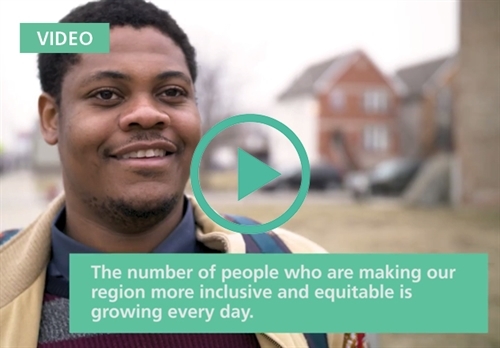
Cardinal Blase Cupich links violence and homicides to Chicago’s legacy of segregation and racism, and the Archdiocese is turning to solutions that address this issue at its root.
This profile is part of a series that highlights the work of government, business and community leaders in creating a more equitable and inclusive Chicago region. Each of these stories is featured in "Our Equitable Future"—two dozen recommendations to advance equity MPC released in response to the 2017 Cost of Segregation findings.
2017 marked the deaths of more than 600 Chicago residents by gun violence. It’s a tragedy with a devastating ripple effect: consequences of gun violence impact entire communities, families, and children.
Last Spring, Cardinal Blase Cupich announced the Archdiocese’s sweeping anti-violence campaign that seeks out and invests in new approaches and partnerships to break the violence-causing cycle of despair, racism and poverty in the city.
“The causes of the violence we are seeing in our city are complex and deep seated,” says Cardinal Cupich, “but I have a strong belief, based on the good will and the efforts of our many dedicated civic and religious leaders, that these causes can be addressed and the suffering can end if we all work together.”
Often citing MPC’s report on The Cost of Segregation, Cardinal Cupich links violence and homicides to Chicago’s legacy of segregation and racism, and the Archdiocese is turning to solutions that address this issue at its root.
“We all own this problem, not just people who live in neighborhoods most affected by violence,” says Cardinal Cupich. “So many of our residents live in segregated enclaves and it’s up to us to go out and bring them into the center. We can do that through education and job opportunities, but also through simple dialogue with people who are different from ourselves.”
Among the activities the Archdiocese is supporting includes new programs that directly address domestic and gang violence, programs that work with men at-risk for gangs and ex-offenders, and job and internship programs.
“Chicago is a great city and has so many assets of wealth and talent. We need to make sure everyone feels included and that’s not currently the case,” says Cardinal Cupich. “Racism and segregation and attitudes of bigotry are passed down from one generation to the next. It’s up to us to break that cycle.”
Explore more of the stories in this series.
Who's advancing equity in the Chicago region right now?
This 5-minute video highlights some government, community and business leaders who are already taking action to make our region more equitable and inclusive every day.

MPC thanks CIBC US for generously sponsoring this video.
